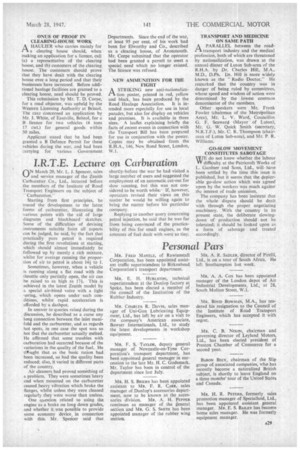I.R.T.E. Lecture
Page 31

If you've noticed an error in this article please click here to report it so we can fix it.
on Carburation
March 20, Mr. L. J. Spencer. sales s.ati and service manager of the Zenith Carburetter Co., Ltd., lectured before the members of the Institute of Road Transport Engineers on the subject of "Carburation,
Starting from first principles, he traced the development to the latest forms of carburetter, illustrating the various points with the aid of large diagrams and blackboard sketches. Some of the difficulties of devising instruments suitable frOm all aspects can be judged, he said, by the fact that practically pure petrol is required during the first revolutions at starting, which should almost immediately be followed up by merely a rich mixture, whilst for average running the proportion of air to petrol is about 14+ to 1.
Sometimes, however, when a vehicle is running along a flat road with the throttle only partially open, the air can be raised to as high as 17+. This is achieved in the latest Zenith model by a special air-bleed valve with a light spring, which opens under such conditions, whilst rapid acceleration is afforded by a dash pot.
In answer to queries raised during the discussion, he described as a curse any long connection between the inlet manifold and the carburetter, and as regards hot spots, in one case the spot was so hot that the carburetter actually melted. He affirmed that some troubles with carburation bad occurred because of the variations in the quality of the fuel. He tleiught that as the basic ration had been increased, so had the quality been reduced; also, it varied in different parts or the country.
Air cleaners had proved something of a problem. They were sometimes heavy and when mounted on the carburetter caused heavy vibration which broke the flanges, whilst unless they were cleaned regularly they were worse than useless.
One question related to using the engine as a brake on long down grades, and whether it was possible to provide some economy device, in connection with this. Mr. Spencer said that shortly before the war he had visited a large number of users and suggested the employment of an automatic cut-out for slow running, but this was not considered to be worth while. if, however, operators revised their views on this matter he would be willing again to bring the matter before his particular company.
Replying to another query concerning petrol injection, he said that he was far from being convinced of the practicability of this for small engines, as the amounts of fuel dealt with were so tiny.
















































































